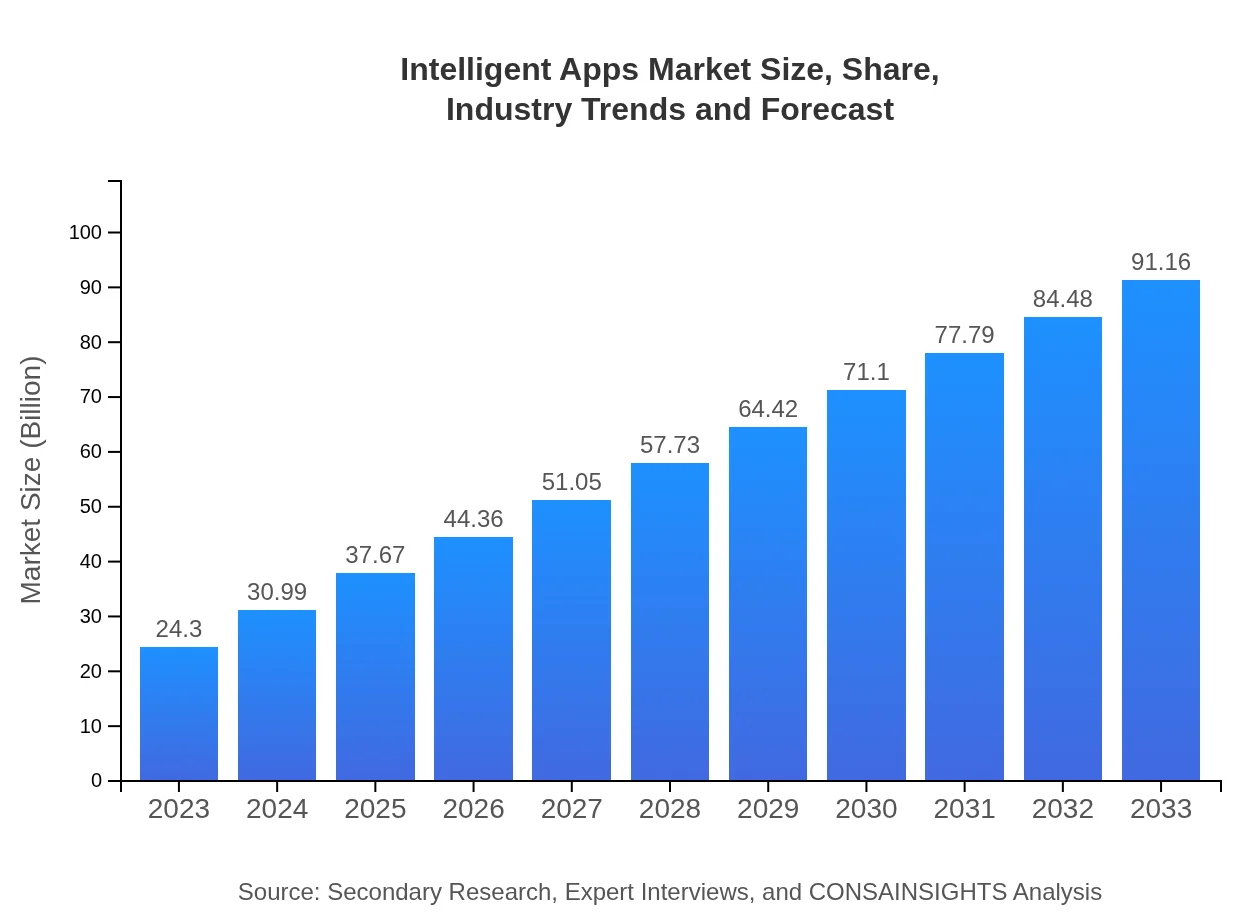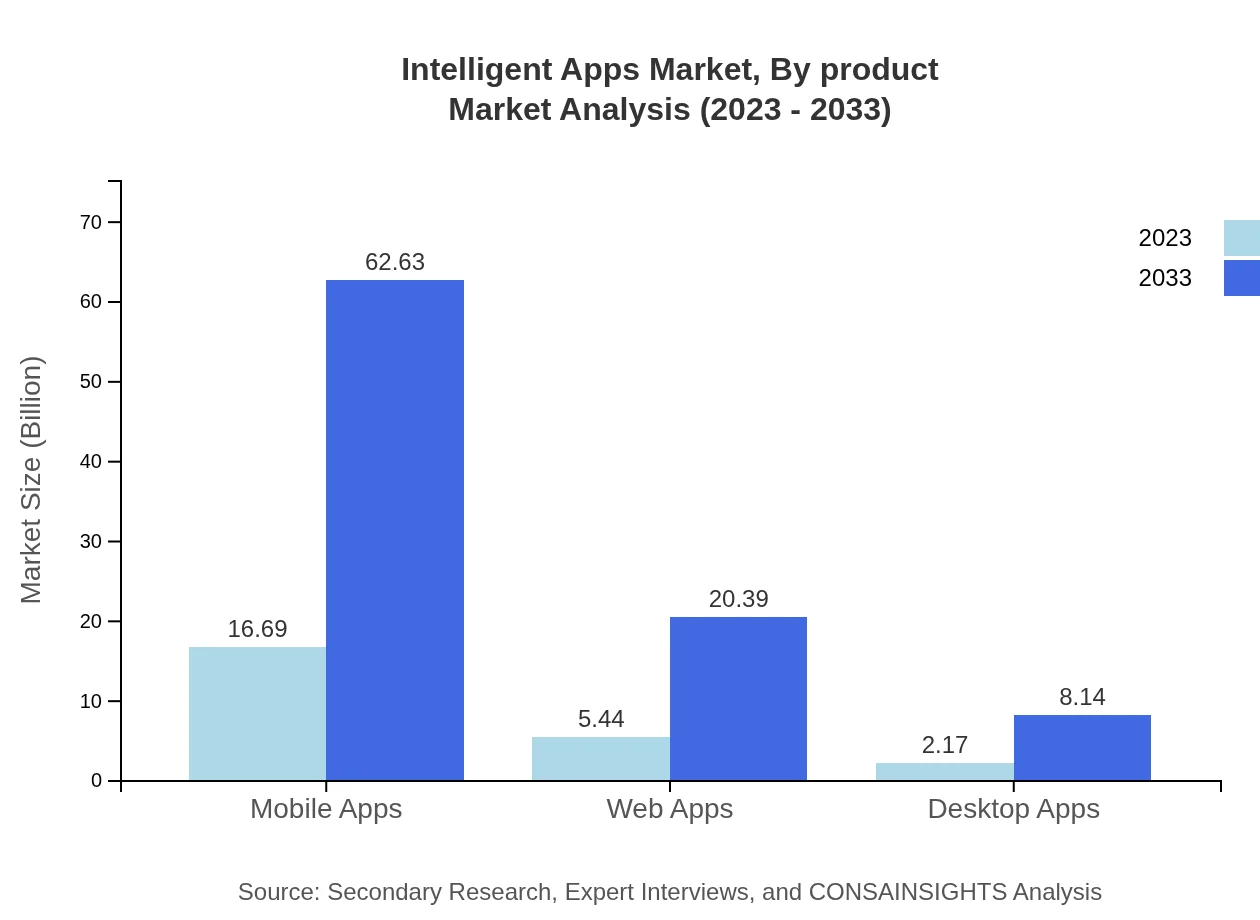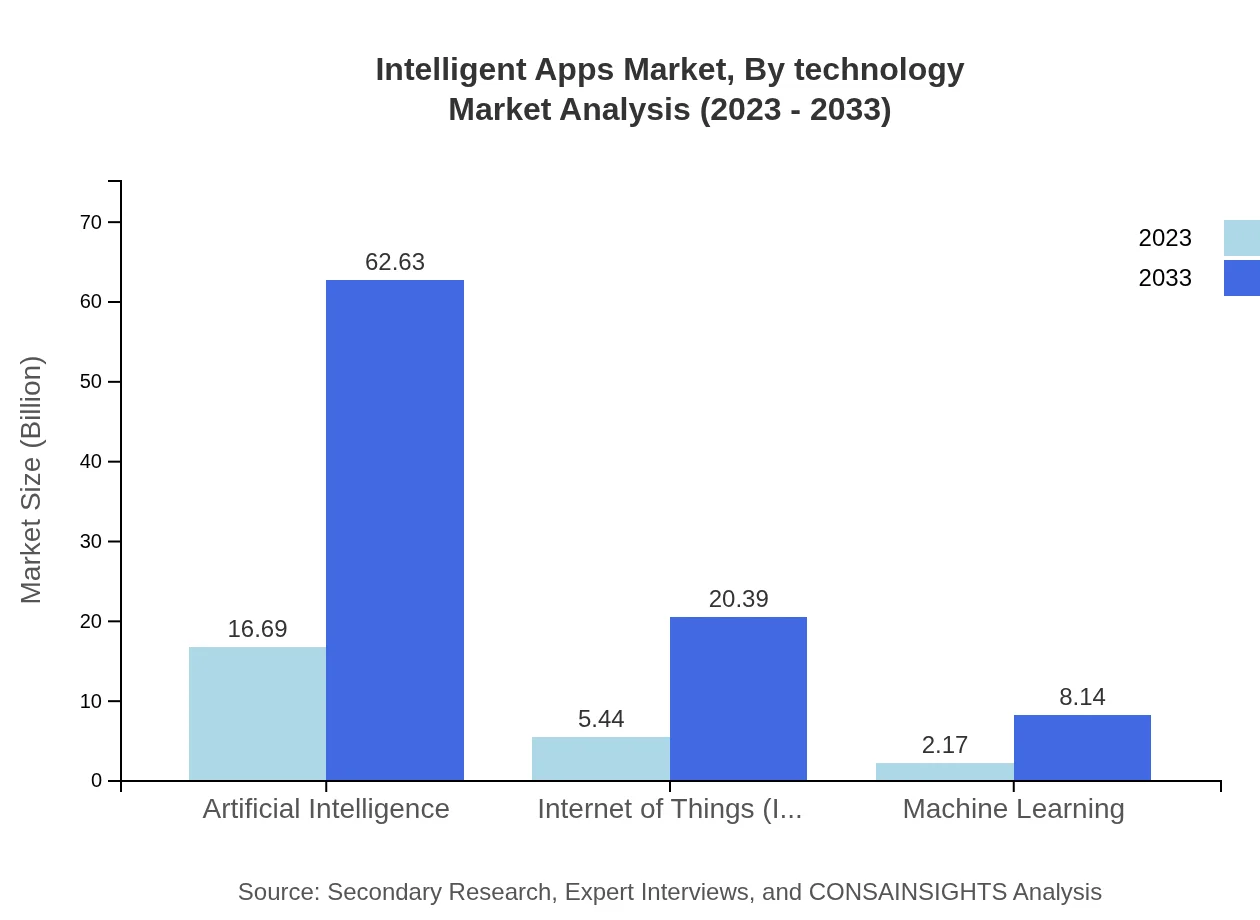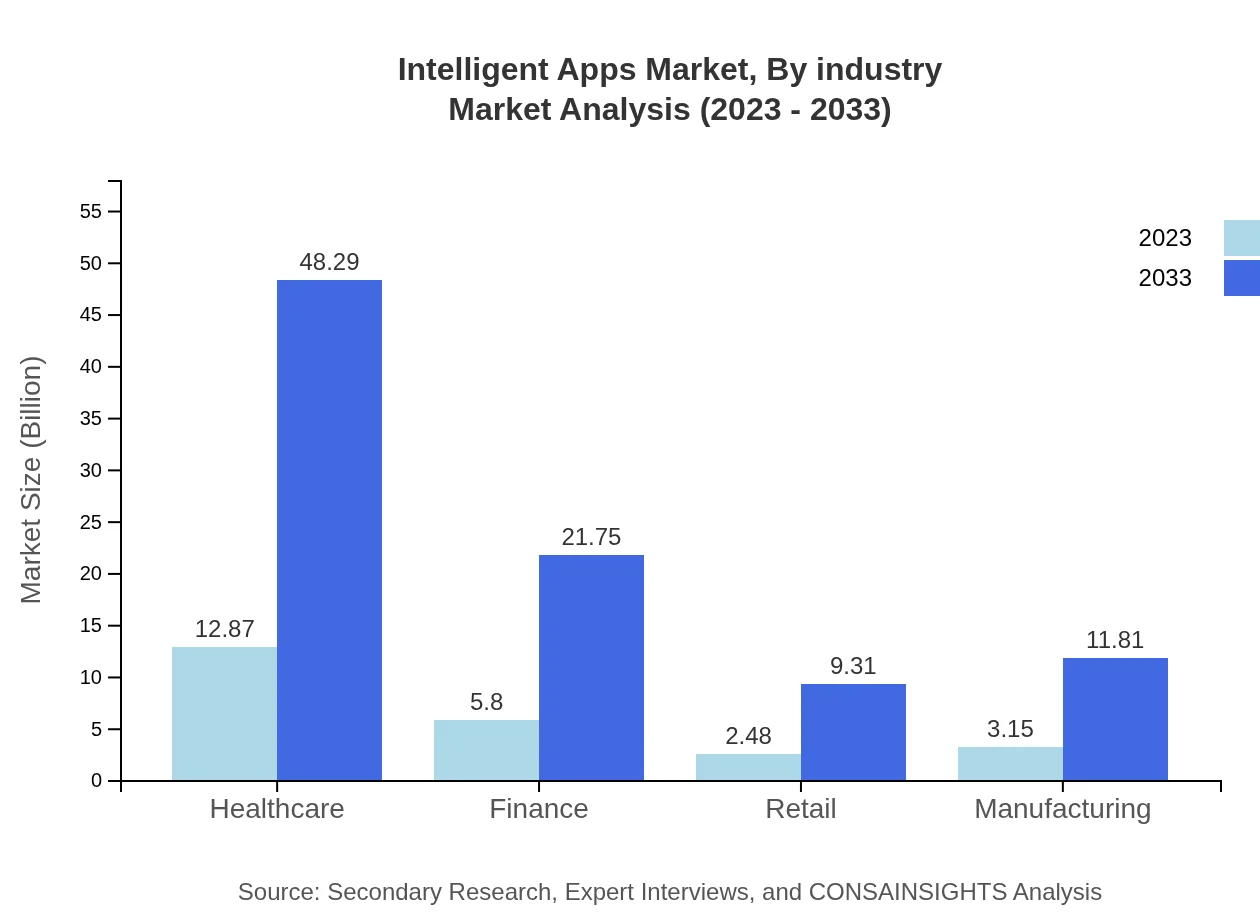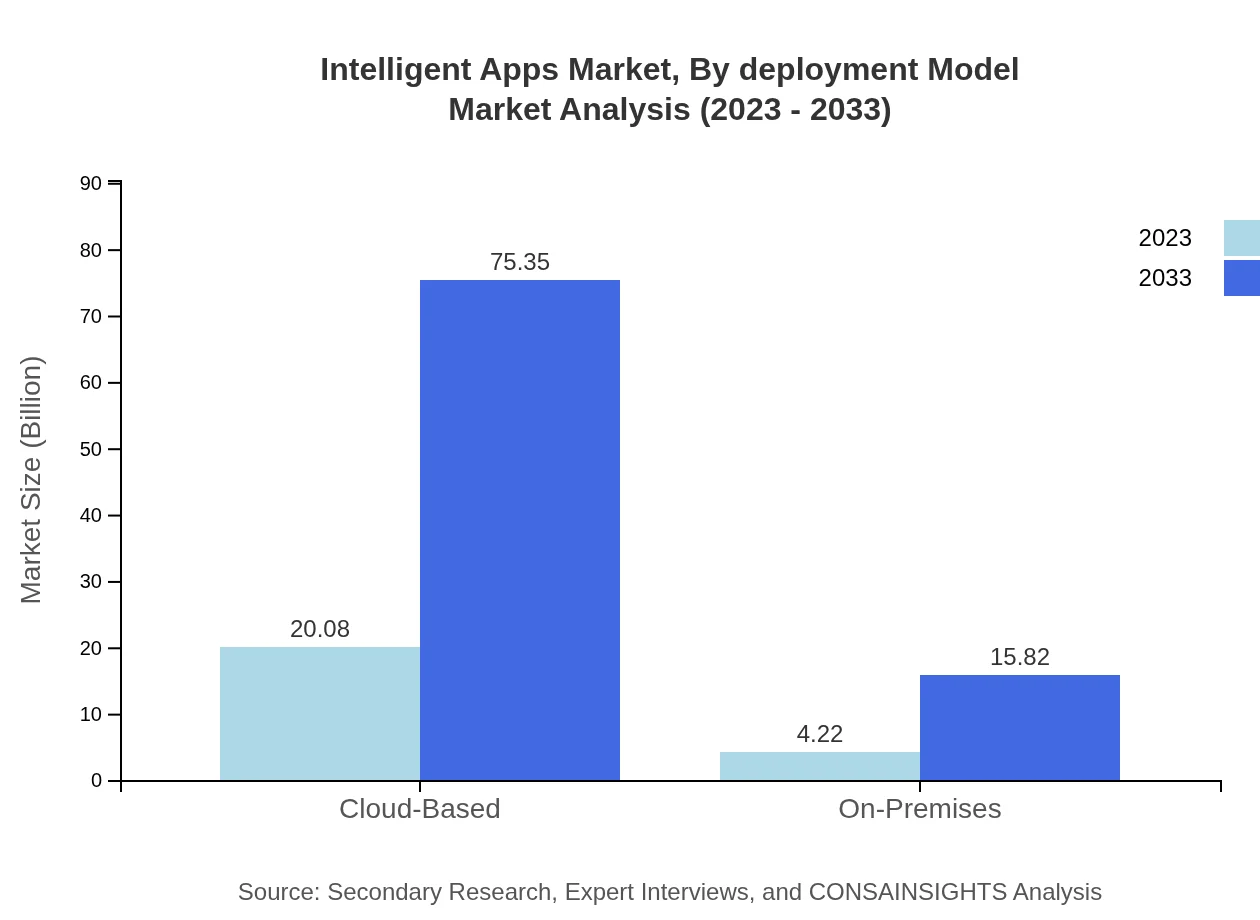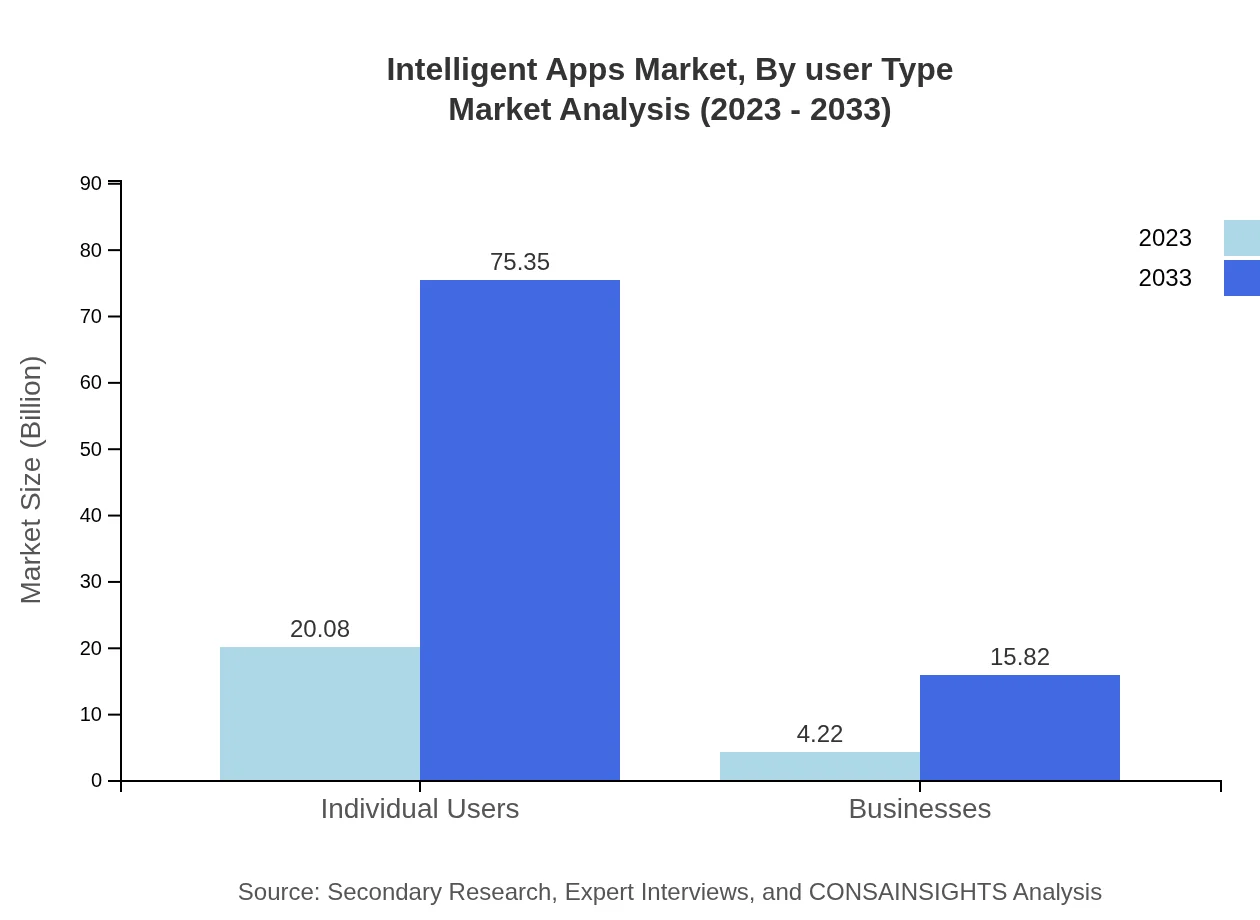Intelligent Apps Market Report
Published Date: 31 January 2026 | Report Code: intelligent-apps
Intelligent Apps Market Size, Share, Industry Trends and Forecast to 2033
This report provides an in-depth analysis of the Intelligent Apps market from 2023 to 2033, covering market size, growth potential, industry insights, regional dynamics, technological trends, and key players shaping the landscape. Additionally, it forecasts future trends and challenges within the industry.
| Metric | Value |
|---|---|
| Study Period | 2023 - 2033 |
| 2023 Market Size | $24.30 Billion |
| CAGR (2023-2033) | 13.5% |
| 2033 Market Size | $91.16 Billion |
| Top Companies | Google LLC, Microsoft Corporation, Amazon Web Services (AWS) |
| Last Modified Date | 31 January 2026 |
Intelligent Apps Market Overview
Customize Intelligent Apps Market Report market research report
- ✔ Get in-depth analysis of Intelligent Apps market size, growth, and forecasts.
- ✔ Understand Intelligent Apps's regional dynamics and industry-specific trends.
- ✔ Identify potential applications, end-user demand, and growth segments in Intelligent Apps
What is the Market Size & CAGR of Intelligent Apps market in 2023 and 2033?
Intelligent Apps Industry Analysis
Intelligent Apps Market Segmentation and Scope
Tell us your focus area and get a customized research report.
Intelligent Apps Market Analysis Report by Region
Europe Intelligent Apps Market Report:
The European Intelligent Apps market stood at USD 6.85 billion in 2023 and is expected to grow to USD 25.71 billion by 2033. Regulatory support for AI technologies, coupled with an increased focus on data privacy and user-centric solutions, is propelling market expansion in this region.Asia Pacific Intelligent Apps Market Report:
In 2023, the Asia Pacific Intelligent Apps market is valued at USD 4.67 billion, expected to expand to USD 17.50 billion by 2033. This growth is driven by increasing smartphone penetration, a rise in mobile internet users, and a substantial investment in developing smart city initiatives in countries like China and India, fostering a favorable environment for intelligent application adoption.North America Intelligent Apps Market Report:
North America, with a market size of USD 8.72 billion in 2023, is projected to reach USD 32.72 billion by 2033. The region's advanced technological infrastructure, high adoption rates of smart devices, and a strong focus on innovation amongst key players drive significant market growth.South America Intelligent Apps Market Report:
The South American market for Intelligent Apps is anticipated to grow from USD 1.48 billion in 2023 to USD 5.55 billion in 2033. Factors influencing this growth include the growing mobile user base, digital transformation efforts in the public and private sectors, and an increasing focus on leveraging technology to enhance user experiences.Middle East & Africa Intelligent Apps Market Report:
The market in the Middle East and Africa is projected to grow from USD 2.58 billion in 2023 to USD 9.68 billion by 2033, influenced by rising investment in smart technology sectors and the increasing adaptation of AI applications across different sectors, especially in finance and healthcare.Tell us your focus area and get a customized research report.
Intelligent Apps Market Analysis By Product
In the product segmentation, mobile apps dominate the Intelligent Apps market, showcasing a value of USD 16.69 billion in 2023, expected to soar to USD 62.63 billion by 2033. Web apps follow with a value of USD 5.44 billion in 2023, growing to USD 20.39 billion, while desktop apps hold a comparatively smaller share, moving from USD 2.17 billion to USD 8.14 billion over the same period.
Intelligent Apps Market Analysis By Technology
The technology segmentation reveals that Artificial Intelligence dominates the market, expected to reach USD 62.63 billion by 2033 from USD 16.69 billion in 2023, constituting a significant share. Internet of Things (IoT) applications show notable growth as well, with projections moving from USD 5.44 billion to USD 20.39 billion. Machine Learning, while smaller, also shows healthy growth moving from USD 2.17 billion to USD 8.14 billion, reflecting the increasing application of these technologies in developing smart apps.
Intelligent Apps Market Analysis By Industry
The industry segmentation highlights healthcare as a leading segment, valued at USD 12.87 billion in 2023 and estimated to grow to USD 48.29 billion by 2033. This is followed by finance and retail, showing considerable portions of the market with values of USD 5.80 billion (to USD 21.75 billion) and USD 2.48 billion (to USD 9.31 billion) respectively, as intelligent applications revolutionize user engagement in these sectors.
Intelligent Apps Market Analysis By Deployment Model
In terms of deployment models, the Cloud-Based segment is the most dominant, expected to escalate from USD 20.08 billion in 2023 to USD 75.35 billion by 2033, driven by the flexibility and scalability that cloud solutions offer. In contrast, the On-Premises model is projected to grow from USD 4.22 billion to USD 15.82 billion, as some sectors continue to prefer controlled environments for their applications.
Intelligent Apps Market Analysis By User Type
The segmentation by user type reveals a strong preference for individual users, who represent a significant portion with market size expanding from USD 20.08 billion in 2023 to USD 75.35 billion by 2033. Businesses also show growth, albeit at a slower pace, moving from USD 4.22 billion to USD 15.82 billion, indicating the diverse applications of intelligent apps across various user demographics.
Intelligent Apps Market Trends and Future Forecast
Tell us your focus area and get a customized research report.
Global Market Leaders and Top Companies in Intelligent Apps Industry
Google LLC:
Google is a leading player in the Intelligent Apps market, leveraging its AI capabilities to enhance functionalities across its suite of products, including Google Assistant and various smart applications in Android.Microsoft Corporation:
Microsoft's investment in AI and intelligent technology through platforms like Azure and its Office Suite solidifies its position as a critical market leader, driving innovation in intelligent applications and enhancing user productivity.Amazon Web Services (AWS):
AWS has become a central player in providing cloud-based intelligent application solutions that cater to enterprises seeking scalable and efficient applications supported by machine learning and artificial intelligence.We're grateful to work with incredible clients.









FAQs
What is the market size of intelligent Apps?
The intelligent apps market size is projected to reach approximately $24.3 billion by 2033, growing at a CAGR of 13.5% from 2023.
What are the key market players or companies in the intelligent Apps industry?
Key players in the intelligent-apps industry include tech giants like Google, Apple, Microsoft, IBM, and emerging AI-driven startups that contribute to innovative app solutions.
What are the primary factors driving the growth in the intelligent Apps industry?
Growth in the intelligent-apps market is driven by advancements in AI technology, increasing mobile app usage, and the rising demand for automation and personalized experiences across various sectors.
Which region is the fastest Growing in the intelligent Apps market?
The North American region is the fastest-growing market for intelligent apps, expected to grow from $8.72 billion in 2023 to $32.72 billion by 2033, outpacing other regions significantly.
Does ConsaInsights provide customized market report data for the intelligent Apps industry?
Yes, ConsaInsights offers customized market report data for the intelligent-apps industry, tailored to meet specific client needs and strategic planning requirements.
What deliverables can I expect from this intelligent Apps market research project?
Deliverables include comprehensive market analysis, regional insights, segment performance data, competitive landscape assessments, and growth forecasts tailored to your specific business needs.
What are the market trends of intelligent Apps?
Current trends in the intelligent-apps market focus on increased integration of AI, enhanced user personalization, and the deployment of multi-platform apps to cater to diverse user preferences.

